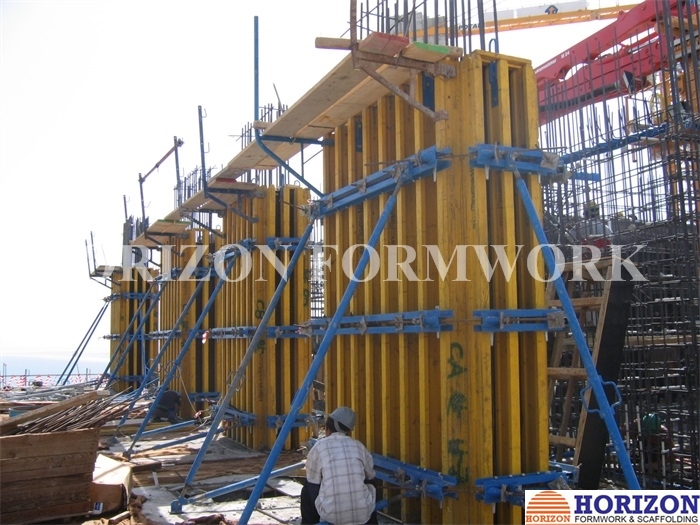Nov . 26, 2024 22:04 Back to list
Innovative Solutions from the Leading Assembled Table Formwork Manufacturer
Assembled Table Formwork Manufacturers Revolutionizing the Construction Industry
The construction industry has witnessed tremendous evolution over the past few decades, with new technologies and materials emerging to improve efficiency and durability. Among these innovations, assembled table formwork is a game-changer that has significantly optimized the process of concrete construction. A growing number of manufacturers are specializing in this type of formwork, offering solutions that address the diverse needs of the market.
Understanding Assembled Table Formwork
Assembled table formwork is a system designed to create flat surfaces for concrete pours, particularly in large-scale projects such as commercial buildings, bridges, and infrastructure. The system typically consists of pre-made panels, props, and accessories that can be easily assembled on-site, allowing for rapid deployment and operational efficiency.
The key advantages of using assembled table formwork include reduced labor costs, shorter construction timelines, and improved safety on the job site. The lightweight nature of the system means that it requires fewer workers to handle and manipulate the components, thus minimizing the risk of injury. Furthermore, the precise engineering of these components ensures a high degree of accuracy, which leads to superior quality finishes.
The Benefits of Assembled Table Formwork
1. Speed and Efficiency Traditional formwork methods can be time-consuming and resource-intensive. With assembled table formwork, construction teams can set up forms more rapidly. The modular design allows for quick assembly and disassembly, which is essential for maintaining project timelines in fast-paced environments.
2. Cost-Effectiveness By streamlining the construction process, assembled table formwork can significantly reduce costs. Labor savings and less material wastage contribute to a more economical approach to concrete construction.
3. Versatility Manufacturers of assembled table formwork cater to various construction needs. These systems can be customized to fit different project specifications, from high-rise buildings to expansive commercial spaces. Additionally, this formwork can accommodate various thicknesses and types of concrete, allowing for flexible design options.
4. Enhanced Safety Safety is paramount in construction, and assembled table formwork promotes a safer work environment. The systems are designed to minimize manual handling and reduce the prevalence of accidents related to heavy lifting and moving cumbersome materials.
assembled table formwork manufacturer

5. Quality Control The precision engineering involved in producing assembled table formwork ensures consistent quality in the finished product. This high level of quality control minimizes the likelihood of defects and costly rework, ensuring a smooth transition from formwork to finished construction.
Choosing the Right Manufacturer
When selecting an assembled table formwork manufacturer, construction companies should consider a variety of factors. The reputation of the manufacturer, the quality of their products, and their ability to provide support and service are all critical components of a successful partnership.
1. Experience and Expertise Look for manufacturers who have a proven track record in the industry. Those with years of experience understand the nuances of the construction process and can provide valuable insights and solutions.
2. Product Range and Customization It’s essential to assess whether the manufacturer offers a wide range of products and customization options. A manufacturer that provides tailored solutions can better meet the specific needs of your project.
3. Technical Support and Training Solid after-sales support is crucial. Choose a manufacturer that offers technical assistance, training for your crew, and readily available replacement parts. This commitment to customer service can make a significant difference in your project's success.
4. Sustainability Practices With the growing focus on sustainability in construction, consider manufacturers that prioritize eco-friendly materials and practices. Sustainable formwork systems can reduce the carbon footprint of your construction projects.
Conclusion
Assembled table formwork represents a pivotal advancement in the construction industry, combining efficiency, versatility, and cost-effectiveness in one comprehensive solution. Manufacturers in this space are pivotal to driving these innovations forward, equipped with the expertise and resources to meet the evolving demands of modern construction. By choosing the right manufacturer, construction companies can significantly enhance their project delivery, ensuring successful outcomes in an increasingly competitive market.
-
High-Quality U Head Jack Scaffolding – Reliable Scaffolding Jack Head Manufacturer & Factory
NewsJul.08,2025
-
High-Quality I Beam H20 Leading Timber Beam H20 Material Factory, Exporters & Manufacturers
NewsJul.08,2025
-
High-Quality Powder Coating Steel Formwork - Durable & Corrosion Resistant Solutions
NewsJul.07,2025
-
Inclined Column Formwork Supplier – Durable & Precise Solutions for Unique Structures
NewsJul.07,2025
-
High-Quality Water Stop Solutions Trusted Water Stop Company & Suppliers
NewsJul.07,2025
-
High-Quality Formwork Material Supplier Reliable Manufacturer & Factory Solutions
NewsJul.06,2025